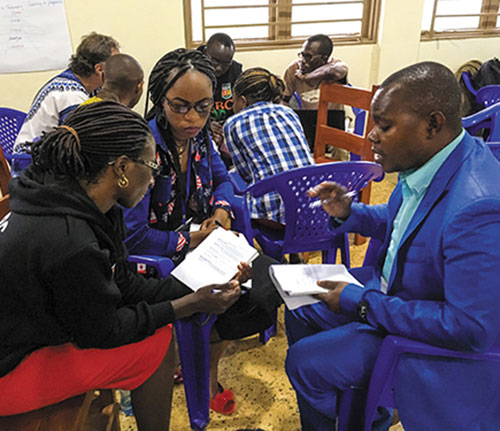Congolese profs excel in messiah’s M.Ed. TESOL program
 Last year, three male professors enrolled in Messiah’s M.Ed. TESOL (Teaching English to Speakers of Other Languages) track. While that fact alone is far from unique, these graduate students happen to live in the Democratic Republic of the Congo, a country at the center of what some observers call “Africa’s world war.”
Last year, three male professors enrolled in Messiah’s M.Ed. TESOL (Teaching English to Speakers of Other Languages) track. While that fact alone is far from unique, these graduate students happen to live in the Democratic Republic of the Congo, a country at the center of what some observers call “Africa’s world war.”
As faculty members at the Christian Bilingual University of Congo—which, in French, is called the Université Chrétienne Bilingue du Congo (UCBC)—Célestin Mukirania, John Muthambuko and Mashauri Malonga are working to become leaders who are “being transformed, to transform.”
How did they hear about another Christian college 7,000 miles across the Atlantic? It all began in 2015, when Mary Henton, UCBC’s director of faculty development and bilingual affairs, contacted Jan Dormer, Messiah associate professor of TESOL. Since a cutting-edge bilingual program is critical at UCBC—where all students are required to learn French and English—Henton sought Dormer’s advice and expertise. A partnership was born.
Last October, Dormer traveled to the UCBC to provide training in bilingual education for the school’s faculty. As part of the required graduate program in education coursework, the three men presented a bilingual program for their institution. Dormer timed their project to coincide with her visit, so she could observe their presentation.
The UCBC faculty saw that our students knew a lot about bilingual education, and when they did group work, or when a professor would ask a question, the others in the room would shout ‘Messiah,’ signifying that those three students would know how to respond,” said Dormer of her training week in the Congo. “Or, when our students would say something relevant, the others would shout, ‘Messiah!’
Through their coursework, the three faculty members discuss Messiah’s impact on their current and future roles as educators. Early in his studies, Muthambuko wrote, “This part of the country has been in trouble of war for so many years. So many people have lost hope, and they no longer believe in positive changes in their life. Hopefully, the university where I am working has focused its vision on restoring that hope. And this is what we as teachers, in any domain, are trying to do for our students and community.”
In his initial post for his first online course, Malonga wrote, “This part of the world has been a theater of war, insecurity, corruption, crimes, massacres, sexual abuse...for almost two decades. Our University has been created to give back hope that people here have lost. I, therefore, teach English to bring hope to the brokenhearted people within my community … .”
Now in their fifth course, these three students perform admirably in less than ideal conditions. Though no real-time (synchronous) work is required, students must be able to access the discussion boards and other tools through the internet. Intermittent electricity, a raid on UCBC by bandits and two separate rebel attacks on nearby towns have posed challenges, yet they continue their coursework.
Mukirania posted, “The program at Messiah College has made me a true teacher of students. So I am doing all that relates to my job with the students in mind to help them become all that God created them to become.
As a result, Henton says she wants more UCBC faculty enrolled in graduate studies at Messiah. She is working on securing funding for two UCBC professors to enroll in Messiah’s master’s of higher education program.
“As we all continue to learn from each other – American students learning about challenges and opportunities in the Congo, and the Congolese students learning about American culture and Western academic discourse – we are all the richer,” said Dormer.
— Allyson Patton, assistant to the director of the graduate program in education and to the placement coordinator of the graduate counseling program